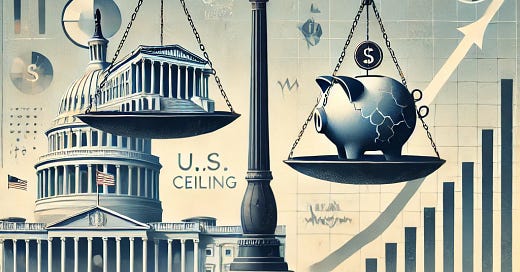Decoding the Debt Ceiling Drama: Why You Should Care (Even if Politics Makes You Yawn)
Hey informed investors,
Okay, I know, I know. "Debt ceiling" sounds about as exciting as watching paint dry, especially with all the political drama swirling around it. But trust me, this seemingly boring topic has the potential to shake up your financial world.
So, let's break it down and understand why you should care, even if politics usually makes you yawn.
What is the Debt Ceiling?
In simple terms, the debt ceiling is a limit set by Congress on how much money the U.S. government can borrow to pay its existing bills. Think of it like a credit limit on your credit card. The government has already spent the money (on things like Social Security, Medicare, national defense, etc.), and the debt ceiling determines how much it can borrow to cover those expenses.
Why is it a Big Deal?
Reaching the debt ceiling means the government can't borrow any more money. If that happens, it could lead to a default, where the U.S. fails to meet its financial obligations. This would have disastrous consequences, including:
Economic chaos: Financial markets could plunge, interest rates could spike, and the economy could be thrown into a recession.
Government shutdown: Essential government services could be disrupted, affecting everything from national security to healthcare.
Damage to U.S. creditworthiness: Defaulting on its debt would damage the U.S.'s reputation as a reliable borrower, potentially leading to higher borrowing costs in the future.
The Political Tug-of-War:
The debt ceiling has become a political football, with lawmakers often using it as leverage to negotiate other policy priorities. This can create uncertainty and anxiety for investors and the public alike.
Why You Should Care:
Even if you're not a political junkie, the debt ceiling drama can impact your wallet in several ways:
Investment volatility: Uncertainty surrounding the debt ceiling can lead to stock market volatility, affecting your investment portfolio.
Higher interest rates: A default or even the threat of a default could lead to higher interest rates on mortgages, loans, and credit cards.
Economic slowdown: A government shutdown or a recession triggered by a debt crisis could impact your job security and overall financial well-being.
Staying Informed:
While the political wrangling can be frustrating, it's essential to stay informed about the debt ceiling debate and its potential implications. Keep an eye on the news, follow the discussions in Congress, and understand how this issue could affect your financial future.
What can you do?
Educate yourself: Learn about the debt ceiling and its potential consequences.
Contact your representatives: Let your elected officials know your concerns about the debt ceiling and urge them to find a responsible solution.
Stay informed: Keep up-to-date on the latest developments and be prepared for potential market volatility.
The debt ceiling debate might seem like a distant political squabble, but its impact can be felt in every corner of the economy. By staying informed and engaged, you can navigate these uncertain times and protect your financial well-being.
Best regards,
Rishi Gottimukkala





